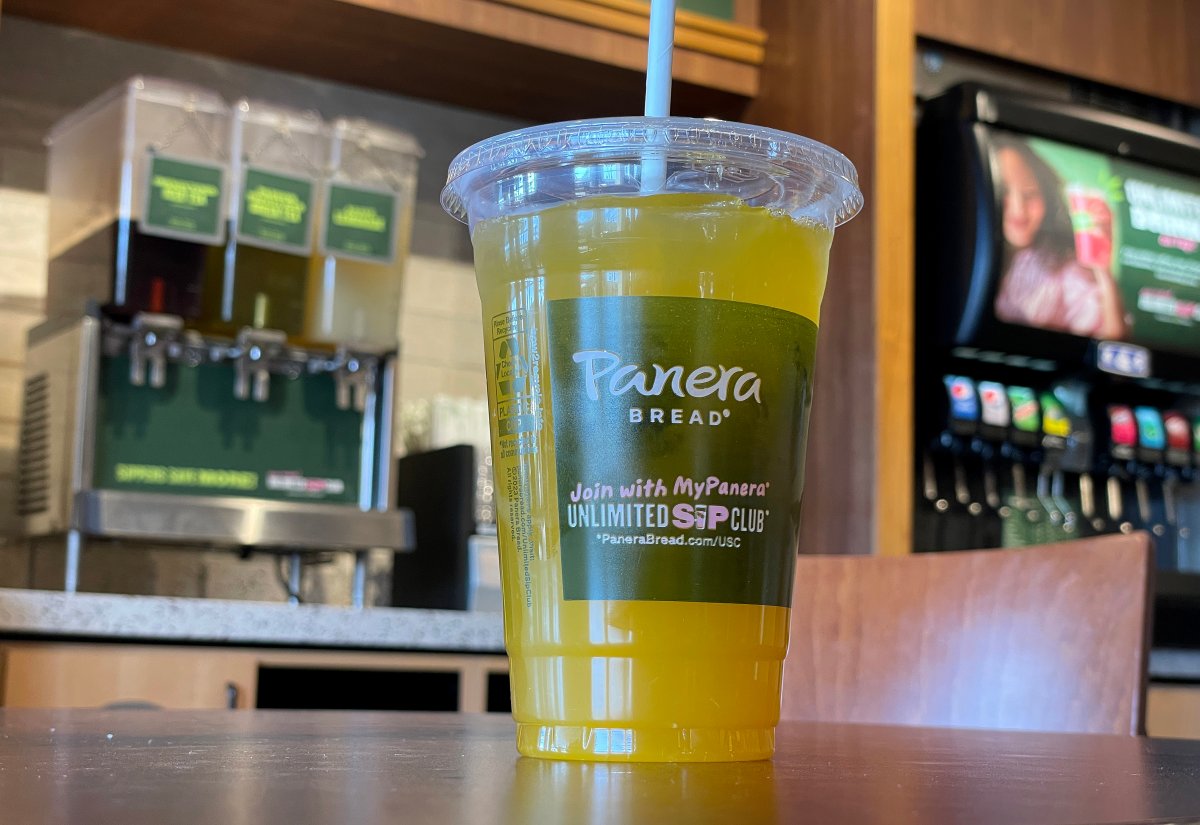For the second time this year, fast-casual chain Panera Bread is being sued for its Charged Lemonade over allegations that the energy drink is “unreasonably dangerous.”

Panera is being blamed for the wrongful death of Dennis Brown, a 46-year-old man with a chromosomal deficiency disorder, ADHD and high blood pressure, in a lawsuit filed Monday in Delaware, where Panera is incorporated.
The suit alleges that Brown ordered a Charged Lemonade and is believed to have refilled his cup twice over the course of an hour and a half before suffering a cardiac arrest on his walk home. He was found unresponsive on the sidewalk and pronounced dead at the scene on Oct. 9, according to media reports. Global News has not independently viewed the lawsuit.
Brown had a mild intellectual disability and blurry vision but lived independently and worked at a supermarket in Fleming Island, Fla. It’s unclear if Brown knew how much caffeine was in the drink. The lawsuit claims that Brown avoided energy drinks because of his high blood pressure.
A large cup of Charged Lemonade has approximately 390 milligrams of caffeine, according to a Panera Bread caffeine guide, last updated in June of this year. That means that a large cup of the beverages contains more caffeine than a can of Red Bull (77.4 mg) and a can of Monster Energy (160 mg) combined.
Health Canada recommends that adults over 18 years consume no more than 400 mg of caffeine per day. A regular 8 oz. cup of brewed coffee has, on average, 135 mg of caffeine.
- Harvey Weinstein hospitalized after return to jail following rape conviction overturn
- California mom accidentally invites 487 people to child’s 1st birthday
- Canada is unblocking aid to Afghanistan but delay is ‘extremely frustrating’: advocate
- ‘Hiroshima-level casualties’ feared in final battle for North Darfur
The wrongful death lawsuit was filed on behalf of Brown’s mother, brother and sister. They are being represented by Philadelphia-based law firm Kline & Specter, PC, which filed a similar suit against Panera Bread less than two months ago.
The first Charged Lemonade lawsuit concerns the case of Sarah Katz, a 21-year-old Ivy League student who died in Sept. last year. At just five years old, Katz was diagnosed with long QT syndrome, a chronic heart condition that can cause fast, chaotic heartbeats, according to the Mayo Clinic. As such, she avoided energy drinks throughout her life on doctor’s recommendations.
Shortly before Katz died, she bought and drank Panera’s Charged Lemonade, a lawsuit filed on behalf of her parents alleges. Later that day, she went into cardiac arrest while at a restaurant with friends. She was rushed to a hospital where she had another cardiac arrest and was pronounced dead.
Katz’s parents believe that their daughter bought the Charged Lemonade “reasonably confident it was a traditional lemonade and/or electrolyte sports drink containing a reasonable amount of caffeine safe for her to drink.”
The lawsuit argued that Panera Bread does not do enough to warn customers of the high level of caffeine in the drink and that the Charged Lemonades are “offered side-by-side with all of Panera’s non-caffeinated and/or less caffeinated drinks.”
Moreover, the drink is mixed “in-house,” meaning the “caffeine content is not controlled and, in turn, has an innate and dangerous potential to vary.”
After the Katz family filed its lawsuit, Panera added enhanced warnings to its Charged Lemonade offerings.
Online, the warning states that “Charged Sips” contain 245-390 mg of caffeine.
Panera advises customers to consume the drink in moderation and that it is not recommended for children, people sensitive to caffeine, or people who are pregnant or nursing.
The drinks are also marketed as “plant-based” and “naturally flavoured.”
Customers were quick to notice the in-store warnings, and some noted on social media that the Charged Lemonade tanks had been moved behind the counter, so patrons would have to ask staff members for refills.
These measures came in late October, mere weeks after Brown’s death.
In a statement, Panera said it expressed “deep sympathy for Mr. Brown’s family” but stood by the safety of its drink.
“Based on our investigation we believe his unfortunate passing was not caused by one of the company’s products,” Panera wrote. “We view this lawsuit, which was filed by the same law firm as a previous claim, to be equally without merit.”
In an interview with NBC, lawyer Elizabeth Crawford, who is working on both wrongful death lawsuits, said that both Brown’s and Katz’s families are trying to raise awareness about the dangers of Charged Lemonade.
“This is a vulnerable population that I think the community at large should help protect. And I feel like Panera failed to do that for Dennis,” she said.
“Dennis’ family, just like the Katz family, hopes that this message gets out to prevent this from happening to another (person).”
There are nine Panera Bread restaurants in Canada, all in Ontario. According to the Panera’s website, three flavours of Charged Lemonade are on sale in Canadian locations.








Comments